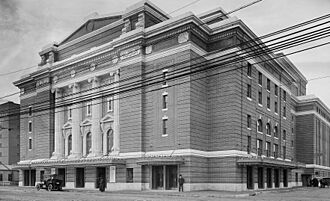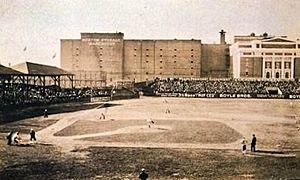Boston Opera House (1909) facts for kids
Quick facts for kids Boston Opera House |
|
|---|---|

The Boston Opera House, c. 1910
|
|
| General information | |
| Type | Opera house |
| Address | Huntington Avenue |
| Town or city | Boston, Massachusetts |
| Country | United States |
| Coordinates | 42°20′26″N 71°5′22″W / 42.34056°N 71.08944°W |
| Opened | November 8, 1909 |
| Demolished | 1958 |
| Owner | Boston Opera Company |
| Design and construction | |
| Architecture firm | Wheelwright and Haven |
The Boston Opera House was a famous opera house in Boston, Massachusetts. It was located on Huntington Avenue. This beautiful building opened in 1909. It was the home of the Boston Opera Company. Sadly, the opera house was torn down in 1958 after it was no longer used.
Today, a building called Speare Hall stands where the opera house once was. Speare Hall is a dormitory for Northeastern University students. You can find it at the corner of Opera Place and Huntington Avenue.
Contents
History of the Boston Opera House

Building the Opera House
The Boston Opera House was designed by two Boston architects, Wheelwright and Haven. Construction started in 1901. However, there were money problems, which caused delays in finishing the building.
In 1908, a rich Bostonian named Eben Dyer Jordan stepped in to help. He gave $700,000 to complete the opera house. This money also helped create the new Boston Opera Company (BOC). Henry Russell, a person who organizes and manages operas, led this new company. Guido Nincheri was in charge of decorating the inside of the theater. The opera house was built close to other important music places, like Boston Symphony Hall and the New England Conservatory of Music.
Grand Opening and Performances
The Boston Opera House officially opened its doors on November 8, 1909. The first show was an opera called La Gioconda, performed by the Boston Opera Company. Famous singers like Lillian Nordica and Louise Homer starred in the show. People at the time described the new theater as a "perfect jewel-box of an opera house."
The Boston Opera House was the main stage for the Boston Opera Company for six years. Henry Russell was the company's director during this time. Arnaldo Conti was the conductor from 1909 to 1913. After the Boston Opera Company closed in 1915, other local opera groups used the venue. The famous Metropolitan Opera also performed there regularly during their visits to Boston.
Why the Opera House Closed
During tough times like the Great Depression and World War II, fewer people went to the opera. The Boston Opera House was not used much and started to fall apart.
In 1957, the city decided the building was unsafe and planned to tear it down. Many people who loved opera protested and asked the city to save it. They wanted to keep their only opera venue. However, the decision to demolish it stood. The strong building was emptied in 1958. It was so well-built that it was hard to tear down! Two different demolition companies gave up because it was so difficult. Finally, a new, bigger wrecking machine was brought in, and the walls came down.
A piece of brick from the demolished theater was saved by a radio announcer named Ron Della Chiesa. It is now kept in the theater's archives at Northeastern University.
See also
 | Bayard Rustin |
 | Jeannette Carter |
 | Jeremiah A. Brown |

